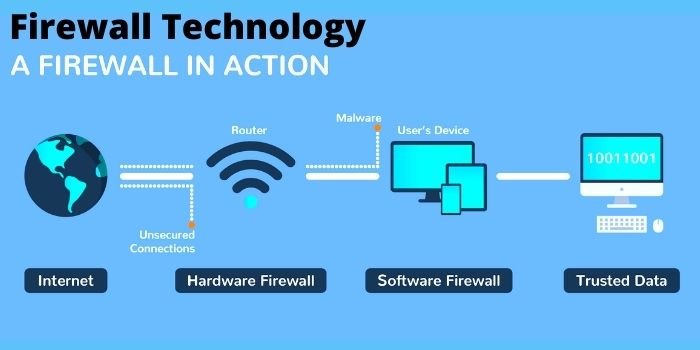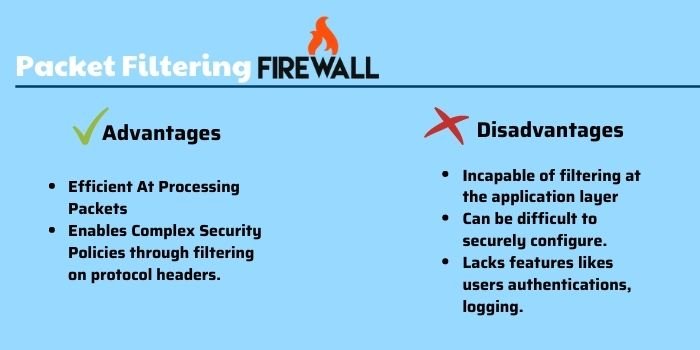
The biggest challenge for any organization is to secure their sensitive data against spyware. They put several strategies or install various software that protects their computers. One of the easiest ways to secure your data is to install a firewall.
Using a firewall which is also known as a network firewall, most of the marketers don’t have an idea of how to configure different types of firewall for their need, or how to find the best firewall.
What is the Firewall?

A firewall is a form of computer security that blocks any kind of unauthorized access to your computer. With the security rules, it can block or permits data packets and monitor the incoming and outgoing network traffic. It comes in both hardware and software forms.
A firewall is a great defence against any kind of spyware that you might encounter. In other words, it acts as a barrier between the internal network and incoming traffic from any external source and might block malicious traffic which contains viruses or sometimes hackers. A firewall isn’t an option but a necessity for every business or organization.
How Does Firewall Technology Works

A firewall analyses your incoming traffic at your computer’s entry point or you can say port, which will determine how external devices communicate or exchange information with each other.
Let us understand with a simple example that how firewall work. Compare the firewall with the security guard standing outside at the entrance of the Ministry Office. He checks every person physically who enters the office and won’t allow entering those who have things like a blade, gun, knife, etc. If he found a person who appears suspicious, he still restricts his entry.
In the same manner, the Firewall acts as a security guard. It secures the corporate network acting as a shield between the inside and outside network. All traffic coming to the system passes through the Firewall and it will decide which traffic is allowed to flow in the system. A firewall restricts the suspicious incoming traffic or viruses that are harmful to our computer.
Different Types Of Firewall
Protecting our corporate networks, there are eight different types of firewalls. Choosing one type of firewall will depend on your business, thus it has different uses for different platforms. Let us know about the types of firewall namely:
- Circuit Level Gateways
- Next-Generation Firewalls
- Packet Filtering Firewalls
- Software Firewalls
- Hardware Firewalls
- Cloud Firewalls
- Proxy Firewalls
- Stateful Inspection Firewalls
Now, let us discuss some key functions of the above-mentioned firewalls.
Circuit Level Gateways:
This is the type of firewall works at the session layer of the OSI model. It creates a virtual connection between internet users and the remote host. This firewall also changes the source IP address and put its own address. So that user’s IP address is hidden and secured from the outside world.

Next-Generation Firewalls:
The NGFW is a combination of stateful inspection including deep packet inspection. To stop the network attacks NGFW uses IPS- intrusion prevention systems. There are some similarities between these firewalls and the original, and those who include TCP handshakes. At the moment this is the most popular firewall being used by companies. NGFW offers extensive application control and visibility, can distinguish between harmful and safe applications, and block viruses from entering a network.

Packet Filtering Firewalls:
This is the oldest firewall type. Packet Filtering Firewall is designed to establish checkpoints at individual routers or switches. This will check the data packets without inspecting the contents. If some information seems to be suspicious, it will not allow getting through the network. The simplest form of firewall that does not impact network performance.

Software Firewalls:
The Software Firewalls is highly useful in creating defense by isolating individual network endpoints from one another. It includes any type of firewall installed on the local device. But to maintain individual software firewall is difficult and it takes a lot of time. Every device is not able to work with a single software firewall.

Hardware Firewalls:
The Hardware Firewalls use physical appliances that are similar to traffic router to intercept data Packets and traffic requests before connected to the network’s server. Physical appliance-based firewalls ensuring that unauthorized traffic is detected from outside the network until the danger is revealed to the company’s network endpoints.

Cloud Firewalls:
The Cloud Firewalls also are known as FAAS (Firewall As A Service). The tremendous benefit of choosing this firewall is that it grows with your business and often moves hand in hand with the proxy firewall. The major task of this firewall is to filter out all the malicious traffic away from your company.

Proxy Firewalls:
The Proxy Firewall or you can say Application Level Firewall, operates at the application level. The main task of this Firewall is to filter the traffic only concerning the application to which they are intended. These are cloud-based which establish traffic connections and examine data packets coming through.

Stateful Inspection Firewall:
The Stateful Inspection Firewalls is the combination of a Circuit-Level Firewall and Packet Filter Firewall. It will also provide a higher level of protection to your business. In other words, this can helps in monitory all the active sessions and connections, also determines which network packet is allowed or disallowed.

Which types of Firewall Is Best For Your Business?
You must ask this question to yourself first. After knowing all the different types of firewalls, it becomes difficult to choose a single firewall for your business. Look, this completely depends on your business type and their security.
You cannot protect your data with only one level of defence. You might choose more than one type of firewall for your business. With my point of view, Cloud, Hardware, and individual software firewall can cover your network. Again I would say, you have to figure it out by yourself knowing your business.
Why Does Every Business Need A Firewall?
No matter you are running a small or a large business, you just need to use the firewall to protect your network from cyber-attacks. Most of the small businesses think they don’t need this but this is very important to survive. Firewall simply protects your network from unwanted viruses, spam, and unauthorized internet traffic.
Without a Firewall, your business is at high risk of being hacked. To reduce that risk, welcome firewalls in your business and do your resource for selecting the best firewalls for your business.


















